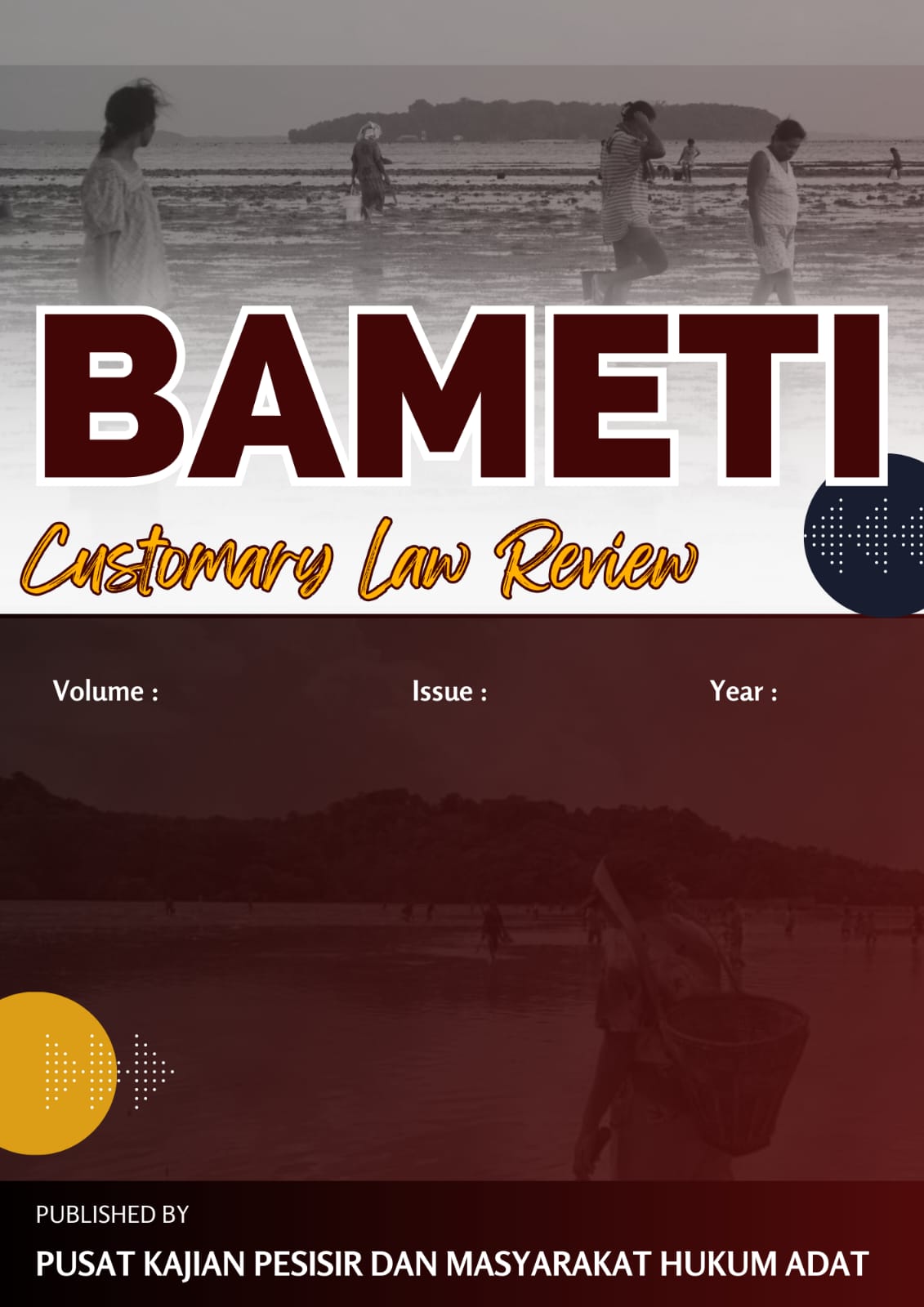Penyelesaian Sengketa Transaksi Tanah Adat
Abstract
This study discusses the legitimacy of customary land transactions, land ownership by conducting land transactions, the emergence of disputes from customary land transactions, and the process of resolving disputes over customary land transactions through litigation and non-litigation channels. Purposes of the Research: To find out the legitimacy of customary land transactions and find out about the dispute resolution process of customary land transactions. This study uses the Normative Law research method which is carried out by examining legal materials related to the problems being studied, using statutory and conceptual approaches, and using primary and secondary data and analyzed descriptively. Results of the Research: Basically transactions are made individually, the transaction still may not conflict with normative provisions that exist in society (requirements for the validity of the agreement/transaction; legal reasons). Because it cannot be separated from society, transactions in customary law can only be said to be valid if individual interests are balanced with the interests of society. In the process of resolving customary land transaction disputes, litigation and non-litigation can be carried out. Settlement of disputes over customary land through litigation as a settlement of disputes between parties which is carried out through examinations before judges in court institutions, in the development of the times the community's need for justice and prosperity is getting bigger. So the settlement of disputes through litigation or courts is gradually felt to be less effective, the settlement of land disputes through litigation is felt to take too long and costs quite a lot. This situation causes justice seekers to look for other alternatives, namely by resolving disputes outside the formal court process, an alternative known as dispute resolution through non-litigation channels.
Downloads
References
Boedi Harsono, “Hukum Agraria Indonesia, Sejarah Pembentukan Undang-undang Pokok Agraria Isi dan Pelaksanaanya”, Cet.1, Djambatan, Jakarta, 2003.
Boedi Harsono, “Sengketa-sengketa Tanah serta Penanggulangannya”, Djambatan, Jakarta, 2005.
Desy Kosita Hallauw, Jenny Kristiana Matuankotta, Novyta Uktolseja, “Analisis Hukum Surat Pelepasan Ha katas Tanah Adat (Dati) di Kota Ambon”, Jurnal Terakreditasi Nasional, SASI, Vol. 26 No. 1, Fakultas Hukum Universitas Pattimura, Ambon, 2020.
Koentjaraningrat dan Irin S. Musnita, “Penyelesaian Sengketa Tanah Ulayat Masyarakat Malamoi di Kabupaten Sorong”, Tesis, Semarang, 2008.
Novyta Uktolseja, Pieter Radjawane, “Tinjauan Juridis Perkembangan Tanah-Tanah Aadat (Dahulu, Kini dan Akan Datang)”, SASI, Vol.25, No.1, 2019.
Putri Ayu Trisnawati, “Jenis-jenis Peralihan Hak Atas Tanah”, 2019, https://pdb-lawfrim.id/jenis-jenis-peralihan-hak-atas-tanah/,(26,02/2023).
Rusmadi Muradl, “Penyelesaian Sengketa Hukum atas Tanah Adat”, Alumi, Madar Maju, Bandung, 1991.
Rahmadi T, “Mediasi Penyelesaian Sengketa Melalui Pendekatan Mufakat”, Rajawali Pers, Jakarta, 2011.
Sudjito,”Prona Pensertifikatian Tanah secara Masal dan Penyelesaian Sengketa Tanah yang bersifat Strategis”, Cet.1, Liberty, Yokyakarta, 1987.
Soerjono Soekanto dan Soeleman B. Taneko, “Hukum Adat Indonesia”, PR. Raja Grafindo Persada, Jakarta, 2021.
Soerjono Soekanto,“Hukum Adat Indonesia”, Cet.14 , Rajawali, Jakarta, 1983.
Sudiyat, & Iman, “Hak Adat Sketsa Azas”, Liberty, Yogyakarta, 1981.
Tolib Setiady, “Intisari Hukum Adat Indonesia dalam Kajian Perpustakaan”, Cet.5, ALFABETA CV, Bandung, 2018.
Yulies Tiena Masriani, “Pengantar Hukum Indonesia”, Cet.1, Sinar Grafika, Jakarta, 2004.
Copyright (c) 2023 Sri Jekan Anggun Bandu, Merry Tjoanda, Novyta Uktolseja

This work is licensed under a Creative Commons Attribution-NonCommercial 4.0 International License.
Authors who publish their manuscripts in this Journal agree to the following conditions:
- The copyright in each article belongs to the author, as well as the right to patent.
- Authors are able to enter into separate, additional contractual arrangements for the non-exclusive distribution of the journal's published version of the work (e.g., post it to an institutional repository or publish it in a book), with an acknowledgment of its initial publication in this journal.
- Authors are permitted and encouraged to post their work online (e.g., in institutional repositories or on their website) prior to and during the submission process, as it can lead to productive exchanges, as well as earlier and greater citation of published work.
- Authors have the right to self-archiving of the article (Author Self-Archiving Policy)













